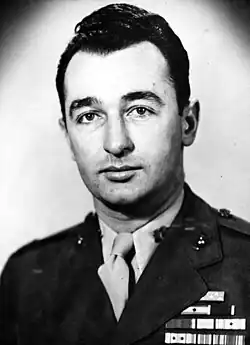Mitchell Paige

Colonel Mitchell Paige (Mihajlo Pejić) (August 31, 1918 – November 15, 2003) was a United States Marine Corps colonel who received the nation's highest military decoration for valor in combat, the Medal of Honor, during World War II.
On October 26, 1942, after thirty-three Marines in his machine gun platoon were killed or wounded defending a ridge during the Battle of Guadalcanal, Platoon Sergeant Paige operated four machine guns, singlehandedly stopping an entire Japanese regiment. He also led a bayonet charge afterwards.
Quotes
.jpg)
Beyond Glory (2003) interview
- Note: Edited interview transcript featured in Beyond Glory: Medal of Honor Heroes in their Own Words (2003) by Larry Smith, New York: W.W. Norton & Company, hardcover, pages 5-18.
- Conoley and his men helped write my citation, apparently. But none of them could join our defense. When the Japanese overran me, there were just so many of them, and it was pitch-dark. Actually, I would literally, absolutely, positively run into them, and they didn't know whether I was Japanese or anybody else. They were just hollering, 'Banzai! Banzai! Banzai!' And all that, and the screaming and hollering and flashes were all over the place, because mortars were landing all around us. That was Captain Lou Ditta; he was firing his mortars right in front of my position. I started with a pistol but that didn't last very long. In the pitch dark you see flashes, just a second, and you can see this thing happening, you can see it's a man there. These Japanese ran their bayonets through one of our guys, and literally picked him up and threw him over their heads.
- p. 12
- I tell you the screaming and hollering you couldnt describe, no way in the world could I describe the sound. You know, a lot of the Japanese could speak English, and, when their assault on us began, this guy started screaming, 'Blood for the Emperor! Blood for the Emperor!' And Stansberry, he was throwing hand grenades and yelling back, 'Blood for Eleanor! Blood for Eleanor!' Bad as it was, I couldn't help but laugh. He and I were just like brothers.
- p. 12
- Every recipient has got to be different because, you take a guy from a coal mine or steel mill or the farm, and he's awarded the Medal of Honor, his life changes immediately.
- p. 18
- We're loyal Americans, Number One. Most of them are dependable. You can depend on them for anything. I think there's a feeling of unity in the society that no other group in the country has because you know that people expect a lot of things from you, and you'll make a concerted effort to abide by that, and honor it. And I always mention that this doesn't belong to me. It belongs to thirty-three other guys, too. And then I can tell the story about that. I don't know how else to tell it because, after all, they were there and fought with me, but they didn't get anything but Purple Hearts. And half of them died. The last thing I ever thought about was a medal.
- p. 18
Quotes about Paige
- For extraordinary heroism and conspicuous gallantry in action above and beyond the call of duty while serving with a company of marines in combat against enemy Japanese forces in the Solomon Islands on 26 October 1942. When the enemy broke through the line directly in front of his position, P/Sgt. Paige, commanding a machine-gun section with fearless determination, continued to direct the fire of his gunners until all his men were either killed or wounded. Alone, against the deadly hail of Japanese shells, he fought with his gun and when it was destroyed, took over another, moving from gun to gun, never ceasing his withering fire against the advancing hordes until reinforcements finally arrived. Then, forming a new line, he dauntlessly and aggressively led a bayonet charge, driving the enemy back and preventing a breakthrough in our lines. His great personal valor and unyielding devotion to duty were in keeping with the highest traditions of the U.S. Naval Service.
- Citation for the Medal of Honor awarded to Paige, presented on 21 May 1943 at Balcombe, Australia, presented by Major General Alexander A. Vandegrift, Commanding Gen. 1st Marine Division[1]
- Colonel Paige's record in World War II epitomizes the ancient rhyme about how small details affect the course of events; the lack of a nail leads to the loss of a shoe, leading to the loss of a horse, rider, battle, and eventually the entire kingdom. It was my belief, and that of many military historians, that such was the case on that horrendous night on Guadalcanal in 1942. If Mitch Paige and his Marines had not held that critical position protecting America's tenuous foothold on Guadalcanal, our first offensive action of World War II might have been emboldened to negotiate a flawed peace treaty with a political price tag almost too high to imagine- the eventual surrender of Southeast Asia, the Hawaiian Islands, and Alaska. Sergeant Paige and his tenacious Marines thus may have altered the course of history. Our Corps of Marines took the offensive, never to lose it.
- Patrick Brent, Chairman, Bradford Adams & Company, 24 July 1996, Foreword to A Marine Named Mitch (1975), Palo Alto: Bradford Adams & Company
- Interestingly enough, when many young Marines ask Colonel Paige about his World War II action, he simply states, "I was just doing the job I was trained to do." Today's Mitch Paige has the same humility, the same candor and the same love of America he has always had. Our country and Marines, past, present, and future, are damn lucky to have a Marine named Mitch.
- Patrick Brent, Chairman, Bradford Adams & Company, 24 July 1996, Foreword to A Marine Named Mitch (1975), Palo Alto: Bradford Adams & Company